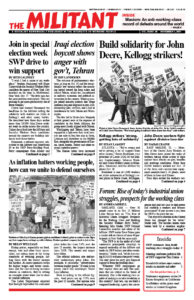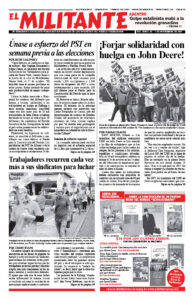The outcome of parliamentary elections in Iraq on Oct. 10 and the exceptionally low turnout reflect the mounting hatred toward the Iraqi rulers and toward Tehran, which has consolidated its military, economic and political intervention in the country. Working people joined massive protests that swept southern Iraq and Baghdad in late 2019, demanding jobs, services, and a halt to interference by both Tehran and Washington.
The bloc led by Shiite cleric Muqtada al-Sadr gained seats at the expense of candidates in the Fatah Alliance, the group most closely aligned with Tehran.
Washington and Tehran have been engaged in a fight over their rival interests not only in Iraq but also in Syria, Lebanon and elsewhere in the Middle East, alongside the governments of Russia, Saudi Arabia, Turkey and other regional capitalist powers.
The Iranian rulers have increased their influence by organizing militias across the region based among Shiite Muslims. Their intervention has brought them into growing conflict with working people across the Mideast and inside Iran, where hundreds of thousands protested the financial and human cost of the Iranian rulers’ military adventures.
For decades the cleric-led capitalist regime in Iran has sought to extend abroad the counterrevolution that it carried through at home. This aimed to push back gains won in struggle by millions of workers, farmers, women and oppressed nationalities during and for a few years after the 1979 Iranian Revolution that overthrew the U.S.-backed shah of Iran.
Anti-government protests in 2019
Protests against intolerable conditions of life and calling for the downfall of the regime erupted in southern Iraq Oct. 1, 2019. Security forces fired live ammunition and Tehran-backed thugs carried out numerous assassinations of protest leaders. More than 600 people were killed and thousands more were injured or jailed before protests were finally quelled months later. The issues that spurred the demonstrators remain unresolved.
With almost 60% of registered voters staying home for this election, the sixth since the U.S.-led invasion in 2003, the turnout was a record low. Anti-government protesters had called for a boycott. The election didn’t produce a clear majority among the rival capitalist parties, nor one that settled a clear course forward for a government.
Competing Shiite groups, the majority of Iraq’s population, have dominated capitalist politics since the U.S. rulers’ invasion that toppled the Sunni-based Saddam Hussein government. After Washington dismantled Saddam’s Baathist regime, government posts were divided along religious and ethnic lines. Officials from the religious-based parties used this to siphon off millions of dollars from the state’s oil wealth, with little regard for the conditions of working people.
Al-Sadr’s Shiite-based Sairoon Alliance has become the largest electoral bloc in the Iraqi parliament, increasing its total from 54 to at least 73 out of 329 seats. He presents himself as a champion of the downtrodden. After supporting the imperialist overthrow of Saddam, in 2004 his militias attacked both occupying U.S. and British troops as well as the remnants of Saddam’s Baathist forces.
Al-Sadr at first supported the anti-government protests in 2019. Then, under pressure from Tehran, his forces attacked demonstrators.
The pro-Tehran Fatah grouping lost more than half its seats. Washington was briefly aligned with Tehran’s forces in Iraq during its bombardment and defeat of Islamic State, which had seized substantial parts of the country from 2014 to 2017.
Pro-Tehran parties demand the withdrawal of the 2,500 U.S. troops remaining in Iraq. Al-Sadr now says he accepts the continued presence of U.S. forces, winning him tacit backing from Washington.
A further unresolved crisis in Iraq — and in Iran, Syria and Turkey — is the oppressed Kurdish nationality. The Kurdish Democratic Party won in the Kurdish region of Iraq, with Kurdish deputies obtaining 60 seats. Some veterans of anti-government protests ran in the election as the Tishreen (October) movement, winning seats in Baghdad and the country’s south.
Al-Sadr’s bloc is now seeking allies to appoint a prime minister and a new coalition government.

